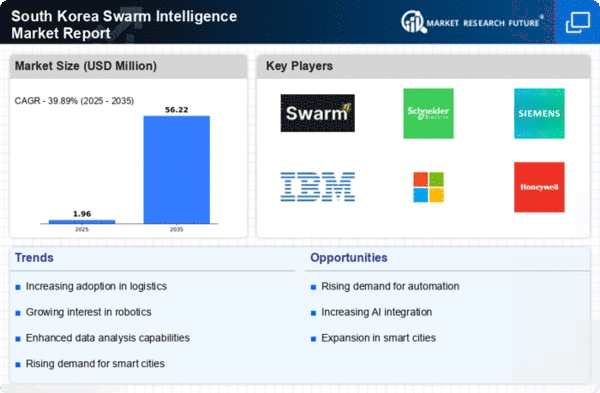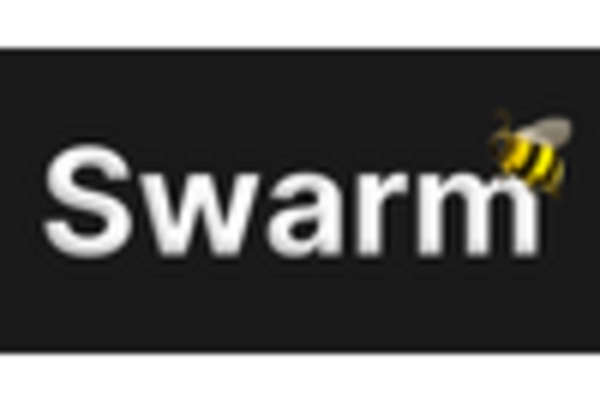Rising Demand for Autonomous Systems
The swarm intelligence market in South Korea is experiencing a notable surge in demand for autonomous systems across various sectors. Industries such as logistics, agriculture, and manufacturing are increasingly adopting swarm intelligence technologies to enhance operational efficiency. For instance, the logistics sector is projected to grow by approximately 15% annually, driven by the need for automated delivery systems. This trend indicates a shift towards more intelligent and adaptive systems that can operate collaboratively, thereby optimizing resource allocation and reducing costs. The integration of swarm intelligence in autonomous vehicles and drones is particularly significant, as it allows for real-time decision-making and improved navigation. As businesses recognize the potential of these technologies, The swarm intelligence market is expected to expand, fostering innovation and competitiveness in the South Korean economy.
Emergence of Smart Cities Initiatives
The emergence of smart city initiatives in South Korea drives the swarm intelligence market. As urban areas become increasingly complex, the need for intelligent systems that can manage resources efficiently is paramount. Swarm intelligence technologies are being integrated into smart city projects to enhance traffic management, waste disposal, and energy distribution. The South Korean government has committed over $5 billion to develop smart city infrastructure by 2027, demonstrating a strong focus on innovative solutions. This investment is likely to accelerate the adoption of swarm intelligence applications, as cities seek to improve sustainability and livability. The swarm intelligence market stands to benefit from these initiatives, as they create opportunities for collaboration between technology providers and urban planners, ultimately leading to smarter, more efficient cities.
Advancements in Artificial Intelligence
Recent advancements in artificial intelligence (AI) are significantly influencing the swarm intelligence market in South Korea. The integration of AI algorithms with swarm intelligence principles enables the development of more sophisticated systems capable of complex problem-solving. For example, AI-driven swarm robotics can perform tasks such as search and rescue operations or environmental monitoring with enhanced precision. The market for AI in South Korea is expected to reach $10 billion by 2026, reflecting a growing investment in technology that complements swarm intelligence. This synergy between AI and swarm intelligence not only enhances the capabilities of autonomous systems but also drives innovation in sectors like healthcare and urban planning. As these technologies evolve, the swarm intelligence market is poised for substantial growth, potentially transforming various industries.
Growing Need for Real-Time Data Processing
The increasing need for real-time data processing is shaping the swarm intelligence market in South Korea. As industries generate vast amounts of data, the ability to analyze and act on this information swiftly becomes paramount. Swarm intelligence technologies offer solutions that can process data in real-time, enabling businesses to make informed decisions quickly. For instance, in sectors like finance and telecommunications, the demand for real-time analytics is expected to grow by 20% annually. This trend highlights the importance of swarm intelligence in enhancing data-driven decision-making processes. By leveraging collective intelligence, organizations can optimize operations, improve customer experiences, and respond effectively to market changes. Consequently, the swarm intelligence market is likely to expand as more companies seek to harness the power of real-time data processing.
Increased Investment in Research and Development
Investment in research and development (R&D) is a critical driver for the swarm intelligence market in South Korea. The government and private sector are allocating substantial resources to explore innovative applications of swarm intelligence technologies. In 2025, R&D spending in the technology sector is projected to exceed $15 billion, with a significant portion directed towards swarm intelligence initiatives. This investment fosters collaboration between academic institutions and industry players, leading to breakthroughs in areas such as robotics, data analysis, and smart city solutions. The emphasis on R&D not only enhances the technological landscape but also positions South Korea as a leader in swarm intelligence applications. As new discoveries emerge, the swarm intelligence market is likely to benefit from a continuous influx of innovative solutions, driving further adoption across various sectors.
















